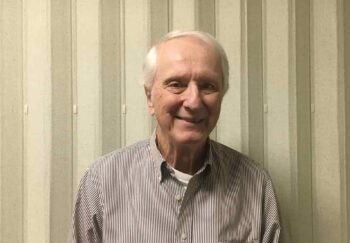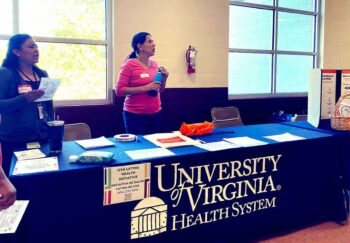Tony was only 53. But he was often short of breath and too tired to play with his kids or enjoy golf. We often think heart failure only happens to older people, but younger adults like Tony with other (sometimes undiagnosed) heart conditions or other risk factors can also develop it. According to the American Heart Association, about 5.7 million Americans have heard failure, including 10 percent of people over 80. In some cases, you might not even know you have heart disease until you begin having heart failure symptoms.
Do you know the signs and symptoms of heart failure? You can learn more about heart failure at our community lecture Thursday, May 26, 6:00-7:30 p.m. at UVA Alumni Hall. Dr. James Bergin and nurse practitioners Carole Ballew and Nita Reigle will discuss the latest treatment options. We talked to them to get some more information before the event.
What is Heart Failure?
The word “failure” implies that the heart just stops, but that’s not the case. Instead, the heart can’t pump enough blood through the body to keep it up to speed, either because the heart muscle is weak or it’s too stiff to fill with blood. There are many causes of heart failure, but coronary artery disease or heart attack are two of the most common.
Teamwork is Key
“We have a team to address the many different needs of the patients,” Reigle said. At the UVA Heart Failure and Transplant Center, heart failure patients work with:
- Nutritionists, who develop individualized diet plans
- Social workers and financial screeners, to help you navigate the complex system of insurance, Medicare, Medicaid and disability
- Nurse practitioners, who provide education tailored to your needs and follow you throughout your care
- Board-certified cardiologists who offer a wide range of treatment options
“We also participate in cutting-edge research,” Reigle said. “We give patients an opportunity to participate in these studies as appropriate.”
Heart Failure Treatments that Work
Heart failure treatments abound. We help you find the right one for you, like:
- Many different medications
- Lifestyle changes, including exercising and eating a healthy diet
- Heart transplants
- Surgical transplant alternatives
- Surgically implanted devices
Transplants or surgery become necessary when other treatments aren’t enough to prevent repeated hospitalizations or death. One device is the left-ventricular assist device (LVAD), which is battery-operated and helps the heart pump blood through the body. “We’ve rescued many patients who are thriving on these ventricular assist devices or have received heart transplants,” Bergin said. “Without those, they would have died.” A patient might receive an LVAD while waiting for a heart transplant, or the LVAD may eliminate the need for a transplant. LVADs can be a lifesaver for patients who:
Learn More
Find out more about heart failure:
- American Heart Association
- Heart Failure Society of America
- UVA’s Heart Failure and Transplant Center
- Aren’t good candidates for a transplant
- Are too sick to wait for a transplant
- Have good social support
- Have few other health problems
The risks include a possibility of infection and blood clots.
And register online for our community lecture. It’s Thursday night, 6-7:30, UVA Alumni Hall. We’ll provide light refreshments, close-in parking and great information about this common heart condition.

